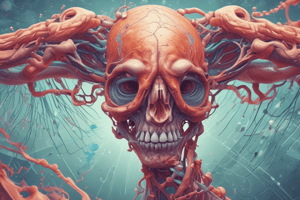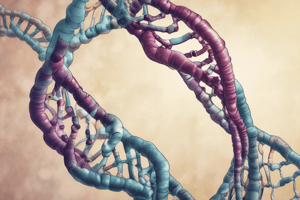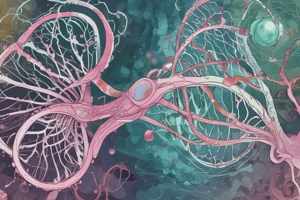Podcast
Questions and Answers
What is the significance of monoclonality in tumors, and how does it differentiate them from non-neoplastic tissues?
What is the significance of monoclonality in tumors, and how does it differentiate them from non-neoplastic tissues?
Monoclonality signifies that tumors originate from a single progenitor cell line, unlike non-neoplastic tissues which are polyclonal, indicating diverse cell origins.
Describe the multistep process of carcinogenesis and its implications for cancer development.
Describe the multistep process of carcinogenesis and its implications for cancer development.
Carcinogenesis is a multistep process involving the accumulation of multiple genetic alterations that lead to the transformed phenotype and associated hallmarks of cancer.
How does tumor heterogeneity arise in cancer, and what impact does it have on treatment strategies?
How does tumor heterogeneity arise in cancer, and what impact does it have on treatment strategies?
Tumor heterogeneity arises from continuous mutations, resulting in genetically diverse tumor cells that can exhibit varying behaviors and resistance to treatments.
Explain the role of genetic abnormalities in cancer development and their origins.
Explain the role of genetic abnormalities in cancer development and their origins.
What are the functions of regulatory genes in cell cycle control, and how can their damage lead to cancer?
What are the functions of regulatory genes in cell cycle control, and how can their damage lead to cancer?
Discuss the concept of the 'two-hit theory' in relation to tumor suppressor genes.
Discuss the concept of the 'two-hit theory' in relation to tumor suppressor genes.
In what way does tumor progression involve ongoing mutations, and how does this affect the cancer's aggressive behavior?
In what way does tumor progression involve ongoing mutations, and how does this affect the cancer's aggressive behavior?
What are the hallmarks of cancer, and why are they critical for understanding cancer biology?
What are the hallmarks of cancer, and why are they critical for understanding cancer biology?
What are proto-oncogenes and what role do they play in cell proliferation?
What are proto-oncogenes and what role do they play in cell proliferation?
How do oncogenes differ from proto-oncogenes?
How do oncogenes differ from proto-oncogenes?
What is the significance of the Ras gene in cancer development?
What is the significance of the Ras gene in cancer development?
Describe the primary functions of tumor suppressor genes.
Describe the primary functions of tumor suppressor genes.
What is the dominant inheritance pattern observed in oncogenes?
What is the dominant inheritance pattern observed in oncogenes?
What role does the BCL2 gene play in follicular lymphoma?
What role does the BCL2 gene play in follicular lymphoma?
How does the P53 gene function as a tumor suppressor?
How does the P53 gene function as a tumor suppressor?
How do DNA repair genes contribute to cancer prevention?
How do DNA repair genes contribute to cancer prevention?
What is the role of apoptosis regulatory genes in cancer?
What is the role of apoptosis regulatory genes in cancer?
In what way are growth suppressor genes considered recessive?
In what way are growth suppressor genes considered recessive?
Describe one hallmark of cancer that demonstrates self-sufficiency in growth signals.
Describe one hallmark of cancer that demonstrates self-sufficiency in growth signals.
Identify the role of the HER2 gene in breast cancer.
Identify the role of the HER2 gene in breast cancer.
What is the significance of evasion of apoptosis in cancer cells?
What is the significance of evasion of apoptosis in cancer cells?
What types of cancers are associated with mutations in the Retinoblastoma (RB) gene?
What types of cancers are associated with mutations in the Retinoblastoma (RB) gene?
What is the effect of point mutations on proto-oncogenes and tumor suppressor genes?
What is the effect of point mutations on proto-oncogenes and tumor suppressor genes?
Explain how sustained angiogenesis supports tumor growth.
Explain how sustained angiogenesis supports tumor growth.
Describe the significance of the BCR-ABL fusion gene in chronic myeloid leukemia.
Describe the significance of the BCR-ABL fusion gene in chronic myeloid leukemia.
What is meant by 'limitless replicative potential' in the context of cancer?
What is meant by 'limitless replicative potential' in the context of cancer?
How do cancer cells evade the host immune response?
How do cancer cells evade the host immune response?
How do gene deletions impact tumor suppressor genes, particularly TP53?
How do gene deletions impact tumor suppressor genes, particularly TP53?
What metabolic alteration occurs in tumor cells, and why is it important?
What metabolic alteration occurs in tumor cells, and why is it important?
Explain the role of gene amplification in oncogenesis, using HER2 as an example.
Explain the role of gene amplification in oncogenesis, using HER2 as an example.
Identify a mechanism by which mutations can lead to oncogene activation.
Identify a mechanism by which mutations can lead to oncogene activation.
What is the clinical value of targeting oncogenes rather than tumor suppressor genes in cancer therapy?
What is the clinical value of targeting oncogenes rather than tumor suppressor genes in cancer therapy?
Flashcards
Cancer Development: A Multi-Step Process
Cancer Development: A Multi-Step Process
Cancer development is a complex process where normal cells transform into cancer cells. It involves multiple genetic alterations that accumulate over time and lead to the development of cancer's characteristics.
Monoclonality of Tumors
Monoclonality of Tumors
Tumors originate from a single progenitor cell, unlike normal tissues that are made up of various cell types.
Multi-Step Process of Cancer Growth
Multi-Step Process of Cancer Growth
Cancer development is a result of several genetic changes happening in the cells over a significant period.
Tumor Heterogeneity
Tumor Heterogeneity
Signup and view all the flashcards
Tumor Progression
Tumor Progression
Signup and view all the flashcards
Genetic Theory of Cancer
Genetic Theory of Cancer
Signup and view all the flashcards
Genetic Regulators of Cell Cycle & Cancer Genes
Genetic Regulators of Cell Cycle & Cancer Genes
Signup and view all the flashcards
Two-Hit Theory
Two-Hit Theory
Signup and view all the flashcards
Proto-oncogenes
Proto-oncogenes
Signup and view all the flashcards
Oncogenes
Oncogenes
Signup and view all the flashcards
Tumor suppressor genes
Tumor suppressor genes
Signup and view all the flashcards
p53
p53
Signup and view all the flashcards
RB gene
RB gene
Signup and view all the flashcards
Apoptosis
Apoptosis
Signup and view all the flashcards
Apoptosis regulatory genes
Apoptosis regulatory genes
Signup and view all the flashcards
Ras gene
Ras gene
Signup and view all the flashcards
HER2 gene
HER2 gene
Signup and view all the flashcards
Myc gene
Myc gene
Signup and view all the flashcards
Self-sufficiency in growth signals
Self-sufficiency in growth signals
Signup and view all the flashcards
Insensitivity to growth-inhibitory signals
Insensitivity to growth-inhibitory signals
Signup and view all the flashcards
Evasion of apoptosis
Evasion of apoptosis
Signup and view all the flashcards
Limitless replicative potential
Limitless replicative potential
Signup and view all the flashcards
Sustained angiogenesis
Sustained angiogenesis
Signup and view all the flashcards
Ability to invade and metastasize
Ability to invade and metastasize
Signup and view all the flashcards
Ability to evade the host immune response
Ability to evade the host immune response
Signup and view all the flashcards
Altered cellular metabolism
Altered cellular metabolism
Signup and view all the flashcards
Point mutation
Point mutation
Signup and view all the flashcards
Proto-oncogenes and tumor suppressor genes
Proto-oncogenes and tumor suppressor genes
Signup and view all the flashcards
Gain-of-function Mutations
Gain-of-function Mutations
Signup and view all the flashcards
Loss-of-function Mutations
Loss-of-function Mutations
Signup and view all the flashcards
Philadelphia (Ph) Chromosome
Philadelphia (Ph) Chromosome
Signup and view all the flashcards
MYC Gene Translocation
MYC Gene Translocation
Signup and view all the flashcards
Study Notes
Molecular Basis of Cancer: Genetic Alterations
- Cancer development is a complex multi-step process arising from the accumulation of genetic alterations in a single progenitor cell
- Tumors are monoclonal (originate from a single cell) in contrast to non-neoplastic tissues which are polyclonal
- Carcinogenesis involves multiple genetic alterations leading to the transformed phenotype
- Tumor progression involves continuous mutations, leading to increased genetic heterogeneity, malignant potential, and aggressive behavior
- Cancer can arise from inherited or induced mutations (chemicals, viruses, radiation)
- Normal genes can become oncogenes by mutation
- Cell cycle regulation is controlled by specific genes that regulate mitosis and apoptosis. Damaged genes can affect cell growth, resulting in uncontrolled cellular proliferation
- Proto-oncogenes are normal genes that promote cell growth. When mutated, they become oncogenes, driving uncontrolled cell growth
- Tumor suppressor genes are critical regulatory genes that inhibit cell growth. Loss of function or mutation results in uncontrolled cell growth
- Apoptosis is cell programmed cell death, mutations in apoptotic genes impede cell death
- Hallmarks of cancer include self-sufficiency in growth signals, insensitivity to anti-growth signals, evasion of apoptosis (cell death), limitless replicative potential, sustained angiogenesis, ability to invade and metastasize, capacity to evade the immune system, and altered metabolism
- Point mutations, gene rearrangements, and gene amplifications are all mechanisms that can cause genetic alterations in normal genes and contribute to oncogenesis
- Targeted gene therapies use drugs to treat cancer by targeting oncogenes without harming healthy cells
- Genetic testing can be used to assess inherited cancer risks
Studying That Suits You
Use AI to generate personalized quizzes and flashcards to suit your learning preferences.




